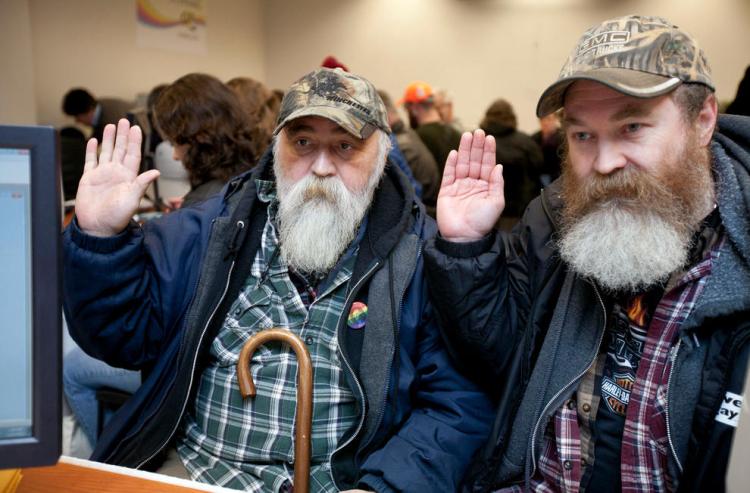If you’re interested in the health care debate, check out these resources.
FACTS
Number of uninsured (per U. S. Census Bureau, 2007): 45.7 million (15.3% of the population) and growing.
Number of adults discriminated against because of a pre-existing condition in the past three years (per White House, 2009): 12.6 million.
Number of states where adults without dependent children are ineligible for Medicaid no matter how low their income (per Families USA): 43.
Number of deaths due to lack of health insurance (per American Journal of Public Health, 2009): 45,000/year (one death every 12 minutes).
Percentage of bankruptcies linked to medical expenses in 2007 (per American Journal of Medicine, 2009): 62% (78% of those had health insurance).
Health care spending (as % of GDP per U.S. Department of Health and Human Services, 2004): 15.3% (highest among all industrial countries).
Growth rates of national health expenditures (vs. GDP from 1960 to 2007 per National Center for Policy Analysis, 2009): 4.79%/year, 721% cumulative vs. GDP at 2.27%/year, 174% cumulative.
Average employer-sponsored premium for a family of four (per McKinsey and Company, 2009): $13,000/year (employee foots about 30% of this cost).
Increase in employer-sponsored premiums (per The Henry J. Kaiser Family Foundation, 2008): 114% in the last 10 years (employee’s share increased from $1,543 to $3,354).
Ranking of U.S. health care system among 190 nations (per World Health Organization, 2000 [latest report]): #37 (worse than France, Italy, San Marino, Andorra, Malta, Singapore, Spain, Oman, Austria, Japan, Norway, Portugal, Monaco, Greece, Iceland, Luxembourg, Netherlands, United Kingdom, Ireland, Switzerland, Belgium, Colombia, Sweden, Cyprus, Germany, Saudi Arabia, United Arab Emirates, Israel, Morocco, Canada, Finland, Australia, Chile, Denmark, Dominica, Costa Rica).
Rating of patient-reported access problems, continuity of care, and waiting times (per The Commonwealth Fund, 2005): #5 (worst of the surveyed 5 countries, behind Austria, Canada, Germany, New Zealand, and UK).
Rates of survival for breast and prostate cancers (per The Lancet Oncology, 2008): #1 (highest [i.e. best]; Japan has highest survival rates for colon and rectal cancers among men; France has highest survival rates for colon and rectal cancer among women; Canada and Australia have very high survival rates for most cancers).
Infant mortality (per CIA World Factbook, 2009): 6.26 per 1,000 (highest among industrial countries).
Ranking of preventable deaths due to treatable conditions (per Health Affairs, 2008): #19 (worst of 19 surveyed countries; if the U.S. health care system performed as well as those of the top three countries, there would be 101,000 fewer deaths in the U.S. per year).
U.S. population using government-run health care, such as Medicare, VA, etc (per U.S. Census Bureau, 2008): 83 million (27.8% of the population).
HISTORY
Ronald Reagan Speaks Out Against Socialized Medicine
Lesson from the history: if you believe the line of arguments about the dangers of Medicare presented by Reagan and now parroted by Sara Palin & friends then you should believe that we have been living under communist dictatorship for many years including two Reagan terms (audio).
Missing Richard Nixon
Paul Krugman compares health reform proposed by Richard Nixon to the current reform (The New York Times).
The Ghosts of Clintoncare
Ezra Klein remembers history and provides some stats on health care costs, insurance company market shares, etc (Washington Post). Quote: “Private [health] insurance is a bit like a fire department that turns a profit by letting buildings burn down.”
Obama v. Nixon
Analysis of the President Barack Obama’s address on health care reform with the similar address by President Richard Nixon.
ANALYSIS
Health Care Realities
Paul Krugman explains the role of the government in regulating health care (Washington Post).
Getting There from Here
Journalist and surgeon Atul Gawande analyzes why American health care needs a reform in the context of health care reforms in other capitalist countries (New Yorker).
Bill Moyers Journal: Health Care Reform
Trudy Lieberman, director of the health and medical reporting program at the CUNY Graduate School of Journalism, and Marcia Angell, senior lecturer in social medicine at Harvard Medical School and former editor in chief of the New England Journal of Medicine talk about the problems of health care system and ways to address them (PBS; video/transcript).
Bill Moyers Journal: Jamieson and Altman
Media analyst Kathleen Hall Jamieson and Kaiser Family Foundation president and CEO Drew Altman discuss the messages in health care ads today, and how well they reflect the real issues of health care reform (PBS; video/transcript).
Bill Moyers Journal: David Frum
Former special assistant to George W. Bush David Frum is calling on Republicans to come up with their own plan for health care reform and suggests changes that conservatives can support; some of the points actually make sense… if you do not pay close attention to details (PBS; video/transcript).
STATISTICS
Achieving a High-Performance Health Care System with Universal Access: What the United States Can Learn from Other Countries
American College of Physicians present the numbers on how the United States stacks up to other countries in a variety of criteria, and what we can learn from the best in the world.
Myth: The U.S. has the best health care system in the world.
Various statistics comparing U.S. health care to other rich nations (with sources).
OECD Health Data 2009 – Frequently Requested Data
Includes lots of most current and historical statistics for U.S. and European countries: expenditures on health (% of GDP, per capita), pharmaceutical expenditures, practicing physicians and nurses (density per 1,000 population), and lots more.
By The Numbers: ‘The Breaking Point’ For American Health Care
Some national health crisis facts.
Swiss Health-Care Costs
Ezra Klein compares health care costs in U.S. and Switzerland (also includes a nice graph showing per capita health care expenditures in different countries).
Simple Arithmetic
The Kaiser Family Foundation’s latest Employer Benefits Survey is out, and they’ve got some numbers worth remembering.
Total health spending (as % of GDP) updated
Gapminder graph showing historic health spending across the world.
THE UNINSURED
The Uninsured
The New York Times editorial describes the groups of people who lack health insurance.
Who Are the Uninsured?
A few statistical data points related to uninsured.
Counting the Uninsured in the U.S.
The income group between $50,000-$70,000 is the fastest-grown segment of the uninsured population.
Yes, Those Uninsured Numbers Are Legit
Why the critique of the number of uninsured — including the arguments that 1) the number includes immigrants; 2) the number includes people who are eligible but not enrolled for public health programs like Medicaid and SCHIP; and 3) the number includes people who make more than a certain income, and supposedly could “afford” coverage — is misleading.
Covering the Uninsured in Medicaid
Explains who can and who cannot receive government-sponsored health care, such as Medicaid and Medicare.
PERSONAL STORIES
The Joy of Rx
A newborn baby is denied health coverage because of “pre-existing condition” (video).
We Love Eric
Eric De La Cruz died while awaiting a heart transplant that was denied and delayed because he could not get insurance due to a pre-existing condition.
Robin Beaton: This Is America And We Deserve Good Health Care
This story illustrates the practice of rescission: retroactive cancellation of health insurance when individual insurance holders become seriously ill (video).
Stories of Health
See stories about people who were injured on the job, are self-employed, cared for a sibling, were affected by the California budget cuts and died.
Firm cancels health insurance coverage for girl, 17, after celiac disease diagnosis
American Community Mutual’s rescission numbers ’cause for concern,’ says director of Illinois Department of Insurance (Chicago Tribune).
How Our Health-Care System Wrecks People Who Play by the Rules
Steve Taylor tells a story of his parents’ struggle with health care bills.
Gambling With Health Care
NOW travels to Nevada, where a huge budget deficit, spiking unemployment, and cuts in Medicaid and other public services are forcing people to gamble with their own lives (PBS; video/transcript).
Critical Condition
Documentary in which ordinary hard-working Americans tell their stories of battling critical illnesses without health insurance (video).
Dawn’s Story: Standing Up for the Health Care We All Deserve
Dawn Smith is fighting brain tumor and CIGNA.
On Mental Health
This is a story about a descent into madness, but not like you think.
Off Topic: I Have Swine Flu & Blue Shield Is Evil
The author of this post explains why he could not get health insurance.
Until Medical Bills Do Us Part
People sometimes divorce husbands or wives to escape their medical bills.
My Encounter with [Insert Scary Music] … Socialized Medicine!
Jim Wallis of Sojourners describes his experience with English health care system (there are some interesting comments).
Marsha Coupé: A life-and-death case for universal coverage
Marsha Coupé describes her experience with English health care system after her husband was diagnosed with a rare and deadly cancer.
We’re Making the Victim of a Murderous Rampage Pay for Her Hospital Stay
An unemployed victim of a murderous rampage is paying the bill for a 5-night hospital stay.
Young People Living, And Laughing, With Cancer
Interesting stories of young women battling cancer (NPR; audio).
The Golden Rule, Insurer Style
What if you or your wife or your daughter had a C section and then were told you couldn’t get health insurance unless you got sterilized? That’s what happened to Peggy Robertson when she tried to buy coverage through UnitedHealthcare’s Golden Rule insurance.
HEALTH CARE DEBATE
Is The Government Responsible For Health Care?
Six experts — three on each side — debate whether universal health coverage should be the federal government’s responsibility.
ETHICAL AND MORAL ASPECTS
Bioethics And The Obama Administration
Bioethicist Arthur Caplan discusses the health care challenges facing the Obama administration (NPR; audio/podcast).
End Of Life Care In America, A Doctor’s Diagnosis
Doctor Robert Martensen illustrates the problems and complexities of American health care system, and argues that safeguarding the quality of a patient’s life sometimes trumps the urge to sustain life at all cost; very interesting personal story (NPR; audio/podcast).
American Values
A recent Brookings poll suggests caring for one another isn’t as far from the American psyche as some like to think.
WHY IS IT SO EXPENSIVE?
Bitter Pill: Why Medical Bills Are Killing Us
The most comprehensive look at the deficiencies of the US health care delivery system that explains why it is so expensive. It also explains how some people can reduce their health care bills.
High health-care costs: It’s all in the pricing
There is a simple reason health care in the United States costs more than it does anywhere else: The prices are higher.
21 graphs that show America’s health-care prices are ludicrous
Excerpts from the 2012 survey data showing the prices that insurers are actually paying for different drugs, devices, and medical services in different countries.
Health Insurance Costs
National Coalition on Health Care examines health care costs in the U.S. using various studies (you can find info on projected spending growth, % of GDP spent on health care, etc).
U.S. Health Care Costs
Another look at the health care costs by the Henry J. Kaiser Family Foundation (includes a nice graph showing percentages spent on administration, profits, etc).
Why Does Health Care Cost So Much?
Shannon Brownlee argues that the main culprit in the soaring cost of American health care is overtreatment… and all that extra care is making us sick; includes info on cost of malpractice insurance (AARP Magazine).
It’s The Prices, Stupid: Why The United States Is So Different From Other Countries
Recent studies by Gerard Anderson, PhD, professor in the Department of Health Policy and Management at the Johns Hopkins Bloomberg School of Public Health and his colleagues show that Americans are paying considerably more for health care than any other developed nation (PDF; see also It’s the Prices Stupid — Why Americans Pay More for Health Care)
Healthcare system wastes up to $800 billion a year
This is what the report from Robert Kelley, vice president of healthcare analytics at Thomson Reuters, found.
We spend $750 billion on unnecessary health care. Two charts explain why.
The 2012 Institute of Medicine report looks at our big health-care spending problem.
Money-Driven Medicine
In this report, the Maggie Mahar reveals how a profit-hungry “medical-industrial complex” has turned health care into a system where millions are squandered on unnecessary tests, unproven and sometimes unwanted procedures and overpriced prescription drugs (PBS; video/transcript).
MALPRACTICE
Myths Debunked: Rising Cost of Medical Malpractice Insurance Is Due to High Jury Awards
References to various articles and studies explaining limited implication of malpractice law suites on the rising costs of health care.
Would Tort Reform Lower Costs?
A pretty comprehensive discussion on the effects of malpractice law suites on medical costs (New York Times).
Would Tort Reform Lower Health Care Costs?
The Wonk Room takes a look at malpractice and tort reform.
Medical Malpractice Costs
Ezra Klein mentions several issues related to malpractice that are rarely raised.
Some Thoughts on Malpractice
In a number of studies doctors and nurses did blind evaluations of malpractice suits and overwhelmingly found them meritorious.
QUALITY
Why Not the Best? Results from the National Scorecard on U.S. Health System Performance, 2011
Updated series of comprehensive assessments of U.S. population health and health care quality, access, efficiency, and equity.
America’s hospital infections problem in one (very long) graphic
Super-long, super-interesting charticle examining the American health-care system.
How to Stop Hospitals From Killing Us
Roughly a quarter of all hospitalized patients will be harmed by a medical error of some kind. If medical errors were a disease, they would be the sixth leading cause of death in America. The human toll aside, medical errors cost the U.S. health-care system tens of billions a year. Some 20% to 30% of all medications, tests and procedures are unnecessary, according to research done by medical specialists, surveying their own fields.
Fighting health care acquired infections
Each year, an estimated 1.7 million U.S. patients catch a bug while being treated for something else. Nearly 100,000 patients die annually from what are formally called “healthcare-associated infections,” or HAIs.
SINGLE PAYER
Bill Moyers Journal: Wolfe and Himmelstein
Doctors Sidney Wolfe and David Himmelstein explain the benefits of the single-payer system (PBS; video/transcript).
Bill Moyers Journal: Donna Smith
Donna Smith and her husband were fully insured, but they lost everything and were forced into bankruptcy after major illnesses and surgeries; today, Donna Smith works as a community organizer and legislative advocate for the California Nurses Association, whose 85,000 members across the country were early champions of a single-payer program (PBS; video/transcript).
A Single-Payer System Would Reduce U.S. Health Care Costs
Ed Weisbart, MD, CPE explains why a single-payer system is better (lots of stats, and facts).
SUPPORTERS
Supporters of the Affordable Health Care for America Act
List of organizations supporting the reform.
Physicians for a National Health Program
Non-profit research and education organization of 17,000 physicians, medical students and health professionals who support single-payer national health insurance. Check Single-Payer FAQ; also lots of other helpful references on single-payer systems are available including overview, facts and myths, economics and financing, quality and malpractice, problems of for-profit care, and more.
Boehner Claims He Doesn’t Know Doctors Who Support House Health Bill, Trashes AMA For Endorsing It
The opposition wants you to think that doctors do not support health care reform.
Doctors Support the Public Option
Doctors overwhelmingly support either a public option or a public system.
Consumers Union
A prominent consumer advocate supports the reform (see also ‘Consumer Reports’ Chief Backs Health Overhaul).
Not All Republicans on the Train to Crazy Town
There are a number of prominent Republicans coming to the fore to endorse health care reform, unfortunately, none of them happen to be in Congress.
THE OPPOSITION
Rewriting Conservatives for Patients’ Rights’ Script
Check the credentials of this spokesman (video/analysis).
Betsy McCaughey’s Ideas Called “Hyperbolic… Dangerous” By Jon Stewart
Betsy McCaughey, who originally suggested that health care reform would result in “death panels” (she did not call them that, though), explains her understanding of the health care bill (three videos; analysis). Now, Betsy McCaughey has ideas on improving health care of her own, like cutting Americans aged 65 to 69 from the Medicare program. It’s good stuff.
Bill Kristol Extended Interview
A key ideologists of the reform opposition admits that government-run health care is the best, but Americans do not deserve it… seriously (video).
Steele: Don’t Raid Medicare To Fund Health Changes
Republican Party Chairman Michael Steele opposes a government-run health care system, as do most members of his party, but he seems to like the government-run Medicare… or does he (NPR; audio/podcast/transcript)?
Joe Wilson’s Dirty Health-Care Secret
Rep. Joe the “You [President Obama] Lie” Wilson (R-SC) is passionate about stopping government-run health care… unless it’s his health care.
GOP-Cited Firm Owned By Insurance Company
Information on Lewin Group which “research” and projections data are cited by the reform opponents (SEIU).
Healthcare foes use fear, not reason
Leonard Pitts reflects on the tactics used by the opponents of the health care reform (Maiami Herald).
Who’s Afraid Of Public Insurance?
Mostly people who haven’t tried it.
ALTERNATIVE PLANS
No Alternative: An Analysis of the GOP Plan
Analysis of the health care plans by Republican Senators Tom Coburn and Jim DeMint.
A Critque of the Republican Response to Obama’s Health Care Speech
Review of the Republican response to President Obama’s health care reform speech.
Do health insurers even want to sell across state lines?
A new paper from Georgetown University researchers suggests a third possible outcome: Absolutely nothing at all will happen. They looked at the three states – Maine, Georgia and Wyoming – that have passed laws allowing insurers from other states to participate in their markets.
LIES AND LIARS
Frank Luntz warns GOP: Health reform is popular
In a 26-page confidential report, Dr. Frank Luntz, a top Republican consultant on the language of politics, gives examples of the talking points that the opposition should use (the ones you hear all the time now).
Conservatives Push ‘End of Life’ Smear
Lies, lies, and more lies… (video).
Drag Me to Health
Republicans warn health care reform will be the worst thing ever (video).
Top Five Health Care Reform Lies—and How to Fight Back
Rebuttal to the most common lies about the health care reform with supporting data.
Truth-telling and Responsibility in Health Care
Jim Wallis talks about one important moral principle for the health-care debate: truth-telling.
Americans Lives vs. Insurance Company Profits: The Real Battle in Health Care Reform
The real story of Shona Holmes — the current poster girl for the liars slandering Canadian health care in an attempt to discredit reform — who alleges she was horribly endangered by Canada’s health care system.
Fox News’ Megyn Kelly Criticizes “Astronomical” Top Tax Rate That “Shocks The Conscience”
Fox’ claims on tax burdens debunked (video/analysis).
Call ‘Em Out: Bachmann
When it comes to lying about health reform, Michele Bachmann is in a class by herself.
Huckabee: Kennedy Was Fighting Cancer To Deny Cancer Patients Ability To Fight The Disease
Huckabee is a lier, too.
HEALTH INSURANCE INDUSTRY
Bill Moyers Journal: Wendell Potter — Profits or Patients
Wendell Potter, a former health insurance insider, explains what is fundamentally wrong with the for-profit health insurance industry (PBS; video/transcript).
Rep. Stupak Questions Witnesses On Rescission Triggers
Over the past five years, almost 20,000 individual insurance policyholders have had their policies rescinded by the three insurance companies: Assurant, UnitedHealth Group, and WellPoint; the CEOs of these three companies confirm that they will continue the practice (video/transcript).
State attorney general targets health insurers
The nurses union said some of the companies had denial rates between 27% and 40% during the first 6 months of 2009. PacifiCare rejected 39.6% of claims it received, Cigna 32.7%, Health Net 30%, Kaiser Permanente 28.3%, and Blue Cross 27.9%.
Profit and the Insurance Industry
Ezra Klein argues that the insurance industry is not a particularly profitable industry.
Sen. Jay Rockefeller (D-WV) calls out health insurance company practice
Sen. Jay Rockefeller summarizes major issues with health care industry.
Sick for Profit
Do you know that UnitedHealthcare CEO Stephen Hemsley makes over $100,000/hour? What is his value added to health care?
The Health Insurance Racket
CIGNAs Edward Hanway spends his holidays in a $13 million beach house in New Jersey. Meanwhile, regular Americans are routinely denied coverage for the care they need when they need it most.
Anthem BCBS Of Maine Proclaims Entitlement To Profits, Demands Government Guarantee 3 Percent Profit
Anthem Blue Cross and Blue Shield of Maine, argued [in court] that the government must guarantee the company a 3% profit.
Someone Else’s Money
Very insightful and entertaining episode examining health care industry from different angles (NPR; audio).
POLITICS
Legislators for sale
Keith Olbermann slams members of Congress for acting more in the interests of their health industry campaign donors than their constituents who so clearly favor health care reform (MSNBC; video).
Senate Republicans Block Own Amendments on Health Care Bill
Sen. Mike Enzi (R) refuses to allow approval of 64 Republican amendments in an attempt to obstruct the process.
Bill Moyers: Robert Reich
Former Labor Secretary talks about the influence of lobbyists on policy, the economy, and the ongoing debate over health care (PBS; video/transcript).
Let Congress Go Without Insurance
Nicholas Kristof offers a modest proposal: If Congress fails to pass comprehensive health reform this year, its members should surrender health insurance in proportion with the American population that is uninsured.
The Politics of Spite
If Republicans think something might be good for the president, they’re against it — whether or not it’s good for America.
The End of Politics
The New Republic and the American Prospect both had good editorials this month on the underlying realities of our politics that have been exposed by health care.
Alan Grayson: “If the President has a BLT tomorrow, the Republicans will try to ban bacon.”
This is Alan Grayson discussing health care on the floor of the House on 10/8/09 (see also Congressman Alan Grayson Says Don’t Get Sick [HQ]; this clip includes quotes from prominent Republicans).
How Drug-Industry Lobbyists Got Their Way on Health Care
Karen Tumulty and Michael Scherer explain how the drug lobby influences the politicians.
ABORTION
Does Health Care Cover Abortion?
Steven Waldman offers a very comprehensive look at aspects of health care reform related to abortion (Wall Street Journal).
In Health Care Battle, a Truce on Abortion
Neither abortion opponents nor abortion rights advocates would use the overhaul effort to advance their agendas.
Abortion and the Baucus health care bill
PolitiFact analyzes the issue of abortion in the Baucus bill.
US VS. THEM
How Does the Quality of U.S. Health Care Compare Internationally?
This brief brings together available evidence on how quality of care in the U.S. compares to that of other countries and comments on the implications of the evidence for the health reform debate.
The U.S. Health System in Perspective: A Comparison of Twelve Industrialized Nations
This analysis concentrated on 2010 OECD health data for Australia, Canada, Denmark, France, Germany, Netherlands, New Zealand, Norway, Sweden, Switzerland, the United Kingdom, and the United States. Health care spending in the U.S. towers over the other countries. The U.S. has fewer hospital beds and physicians, and sees fewer hospital and physician visits, than in most other countries. Prescription drug utilization, prices, and spending all appear to be highest in the U.S., as does the supply, utilization, and price of diagnostic imaging. U.S. performance on a limited set of quality measures is variable, ranking highly on five-year cancer survival, middling on in-hospital case-specific mortality, and poorly on hospital admissions for chronic conditions and amputations due to diabetes. Findings suggest opportunities for cross-national learning to improve health system performance.
Sick Around the World
A Frontline documentary (available online) in which T.R. Reid examines pros and cons of health care systems in United Kingdom, Japan, Germany, Taiwan (adopted universal health care in 1995), and Switzerland (adopted universal health care in 1995); there is also a good comparative summary (PBS). See also T.R. Reid’s follow-up interview with Charlie Rose. There is also an interesting interview (audio/podcast) in which T.R. Reid explains to Terry Gross (Fresh Air) the four basic health care models and how U.S. has all of them; he also describes treatment options — for his wounded shoulder — that he received in different countries (NPR).
Sick Around America
A follow-up to the “Sick Around the World” documentary that focuses on the problems with health care in the U.S. (PBS). Note: T.R. Reid did not like this sequel.
5 Myths About Health Care Around the World
T.R. Reid explains how different industrial countries implemented health care (Washington Post).
5 Myths About Our Ailing Health-Care System
Shannon Brownlee and Ezekiel Emanuel dispel a few myths about how health care works (Washington Post).
The health of nations: here’s how Canada, France, Britain, Germany, and our own Veterans Health Administration manage to cover everybody at less cost and with better care than we do
Ezra Klein compares quality and costs of health care in Canada, France, Britain, Germany, and U.S. Veterans Health Administration (The American Prospect).
How Does the Quality of U.S. Health Care Compare Internationally?
A study by Robert Wood Johnson Foundation examines where the U.S. health care does well, and where it does not, as compared to other countries.
Lessons From the French Health-Care System
Compared with the U.S. health-care system, the French system covers everyone, spends less, and sees its costs rise more slowly.
Why France’s Health Care Is So Good, The Public Option So Bad and the Co-Ops So Incomplete: An Interview With Kent Conrad
Ezra Klein spoke to Conrad about what Americans can learn from other health-care systems, why he opposed the public option and what had felled the Gang of Six.
Beyond Hysterics: The Health Care Model That Works
As America agonizes over remaking health care, it might check out a private/public system that has been in place for years–the one in Germany (Forbes Journal).
Six out of every seven doctors agree: Our health-care system doesn’t work
The nonprofit Commonwealth Fund surveyed primary care doctors in 10 industrialized countries. American doctors turned out to have the lowest rates of job satisfaction. When asked whether our health-care system worked well, about 15 percent agreed.
OH, CANADA!
Everything you ever wanted to know about Canadian health care in one post
Guide to the Canadian health care system.
Does Canada’s Health Care System Need Fixing?
Sarah Varney discusses pluses and minuses of Canadian Health care (NPR).
Universal Health Care Message to Americans From Canadian Doctors & Health Care Experts
Canadian doctors and health care officials speak about their health care system (video).
Canadian healthcare: Fact vs. fiction
Flaws in Canadian system due to lack of democracy and funding, not lack of privatization.
REFORM
Obama Health Care Speech
Video extracts, full video, and transcript (see a critique by Healthcare Economist).
Healthcare Napkins All
Slide show explaining the reason and purpose of health care insurance reform.
Frequently Asked Questions About Health Insurance Reform
White House answers to common questions about the reform.
Get the facts about the stability and security you get from health insurance reform
White House offers some facts.
8 Questions About Health-Care Reform
Answers to common question addressing affects of the proposed health care reform on different people and economy.
Health Insurance Reform in Three Steps
A simple graph that makes the effects of the reform more clear.
What health care reform really looks like
Chart shows how health care would work under H.R. 3200.
How Does The Baucus Mark Handle The Most Contentions Issues Of Reform?
Answers to the most common questions (abortion, etc).
Explaining the excise tax: part 2
Ezra Klein explains how the proposed excise tax is supposed to work.
Obamacare Myths Debunked
Jennifer Bard, a law professor and director of the Health Law Program at the Texas Tech University School of Law to explains what provisions do and do not exist in Obamacare, and what the reform will mean for the average consumer in America.
FAQ: Everything you need to know about Obamacare’s coverage options, in one post
A short primer on what the Affordable Care Act will change about insurance benefits come 2014.
MEDICARE
Tapping Medicare to Pay for the Uninsured
Dean Baker comments on The New York Times article discussing the effects of the health care reform on Medicare.
Michael Steele: GOP Opposes Government Health Care, But Supports Medicare
Republican Party and Medicare (see also McConnell Opposes Medicare Cuts He Once Championed and Better Message Discipline, Please).
Health Reform and Medicare: Part I
Thomas L. Greaney reflects on the history of Medicare (see also Medicare and Health Reform: Part II).
PUBLIC OPTION
Robert Reich Explains the Public Option
Very short but clear explanation (video).
What Is the Public Option?
Tim Foley explains the meaning of the public option in the current version of the health care bill.
Grassley Flustered When Challenged By Schumer On Public Option
Sen. Chuck Grassley’s (R-IA) admitted that Medicare is part of the “social fabric” of America and praised the competition between traditional Medicare and Medicare Advantage, but he could not explain why younger Americans should be afforded the same choice of coverage.
Shep Smith destroys GOP senator on public option
A voice of reason from a Fox News anchor.
HEALTH CARE IN STATES
Why We Should be Listening to Howard Dean
The Commonwealth Fund has completed a state-by-state scorecard which “assesses states’ performance on health care relative to achievable benchmarks for 38 indicators of access, quality, costs, and health outcomes.”
IMMIGRATION
Immigration + Health Care = Run Away
For ten years, our members of Congress and our Presidents from both parties told us it was intolerable for kids to have to go to the emergency room for asthma attacks… unless they weren’t born here.
Do we spend too much on immigrant health care?
Not as much as it is commonly believed.
What The Congressional Research Service Report Really Says About Immigrants And Health Care Reform
Seriously, what does it say?
Why Democrats Should Not Submit To Nativists’ Health Care Demands
Quote: “Another study by the Government Accountability Office found that documentation requirements used to prove medicaid eligibility caused thousands of eligible U.S. citizens to lose Medicaid coverage without saving taxpayers any money: for every $100 spent by taxpayers to implement documentation requirements in six states, only 14 cents were saved.”
Sen. Kay Hutchison Blames Texas Uninsured Rate On ‘Illegal Immigrant Population’
People say illegal immigrants are a large part of the uninsured population (in Texas) but according to the studies by the Texas Department of Insurance, it’s less than 20% of uninsured are illegal immigrants.
Louisiana Senator Says Health Care Reform Will Benefit Undocumented Immigrants Because “It Always Does”
In the case of Medicaid, citizenship requirements led to thousands of Americans being denied or losing coverage, new administrative costs that “far exceeded the savings” by millions of dollars, and only a small handful of undocumented immigrants were caught all within the first two years alone.
Stephanopoulos Checks Pawlenty On Verification: “They Spent $8 Million,” “Caught 8 Illegal Immigrants”
Another case in point: when Colorado passed a series of stringent measures requiring applicants for most state benefits to prove their immigration status, it cost the state $2 million in its first year alone and state officials could not prove that any undocumented immigrants applied for the program in the first place.
Shout Draws Focus to Illegal-Immigrant Issue
“Will some illegal immigrant get [help]? Probably. Will it be this big problem? Probably not,” said Gerald Prante, an economist with the nonpartisan Tax Foundation.
Immigrants, Health Reform, and “Lies”
This controversy should remind us that immigrants remain in a sort of health care purgatory, caught in our two most dysfunctional systems — immigration and health care.
The Case for Insuring Illegal Immigrants
The problem isn’t that health-care reform won’t include illegal immigrants. It’s that it doesn’t, and it should.
Mexico’s health care lures Americans
Thousands of American retirees have quietly found a health care plan with no limits, no deductibles, free medicines, tests, X-rays, eyeglasses, even dental work — all for a flat fee of $250 or less a year… in Mexico (USA Today).
Americans Find A Retirement Haven In Paris
Forbes recommends retiring Americans to move to move abroad, partly because of great health care offered over there.
RELIGION
MSNBC Talks About President Obama’s Meeting with Religious Leaders
Jim Wallis talks with MSNBC about President Obama’s conference call with faith leaders.
Three Moral Issues of Health Care
Three fundamental moral issues that the faith community can focus on and call our political leaders back to: the truth, full access, and cost.
COST OF REFORM
The Baucus Bill: CBO Luvs It
According to Congressional Budget Office, the health care bill will keep reducing the deficit as time goes on.
Baucus: Medicaid Expansion Will Not “Cost States Nearly As Much As Was Originally Feared”
The Medicaid costs with expansion are not going to cost states nearly as much as was originally feared.
Health Reform Subsidy Calculator
Online tool that allows the user to start with the provisions from one of several proposals and examine the impact at different income levels.
CBO Estimates for the Gazillionth Time that Public Option Saves Money
No more, no less.
The Obamacare Shell Game?
Johathan Chait explains how Obama and the republicans are treating fiscal policy.
TAXES
Debunking the NY Post’s Health Care Tax Hysteria
Clear explanation of how health care tax would affect incomes: 1%-1.5% tax is on the incomes above $280K/$350K actually applies to the difference, e.g. if your income is $280,100/year (single), your health care surtax will be 1% of $100 = $1.
To Calculate Huge Top Tax Rate, Fox Pretends All Of Health Reform Will Be Paid For With Tax Increases
Fox News falsely claimed that the entirety of the $1 trillion cost of health care reform is going to paid for with tax hikes on the richest one percent of Americans; not true.
Over Ten Years, Bush Tax Cuts Cost 2.5 Times As Much As House Democrats’ Health Care Plan
Comparison of the Bush’s tax cuts to the cost of the health care reform.
“DEATH PANELS?”
Commentology: Obama and End-of-Life Care
A member of a hospital geriatric emergency team gives her perspective on end-of-life issues.
RESOURCES
Health Care Blog
Daily updates and analysis of events related to health care reform.
Wonk Room
Wonk Room follows offers analysis of economics and political news including health care issues.
Daily Kos: The State of Nation
Focuses on many issues including health care reform.
Healthcare Economist
Jason Shafrin is a Ph.D. Economist aggregates info related to healthcare policy and economics, the health insurance market and, and Medicare research.
The Health Care Blog
Everything you always wanted to know about the health care system but were afraid to ask.
Ezra Klein
Ezra Klein is an associate editor at the American Prospect; he writes on various topics including the health care reform.
Robert Reich’s Blog
Former Secretary of Labor writes about politics, economics, health care and other issues.
HUMOR
Healther Skelter – Obama Death Panel Debate
The Daily Show correspondents debate their preferred form of death panel (video).
Alright Republicans, We Give Up
Rahm Emanuel’s brother will not kill Sarah Palin’s baby (Daily Kos).
What’s Not to Like?
Jonathan Alter: Reform? Why do we need health-care reform? Everything is just fine the way it is (Newsweek).
Drag Me to Health – Universal Health Care
Sam Bee and John Oliver argue over whose country has the worst universal health care system, while Wyatt Cenac is thankful to be an uninsured American (video).
The Bright Side of Death
Satirical song about Blue Cross Blue Shield (video).
Glenn Beck’s Operation
Glenn Beck praises health care which he trashed just a little over a year ago (video).
Don’t Ruin American Healthcare!
Really funny ad (video)!!!
Protect Insurance Companies PSA
Hollywood speaks out to help insurance companies (another funny ad; video).
SNL: Update Thursday: Part 1
The real story of Rep. Joe Wilson’s “You lie” outburst (ha-ha; video).
TOOLS
Health Reform Subsidy Calculator
Online calculator that shows what health care premiums would cost under different proposals (bills) adjusted for various conditions (age, family size, etc).
US Health Care Spending: Who Pays?
The data visualization graph that illustrates historic health care cost distribution.




























